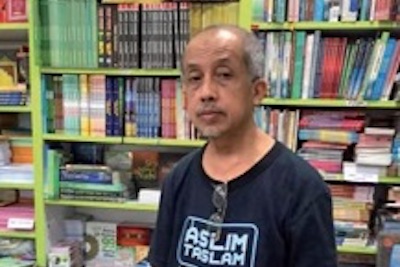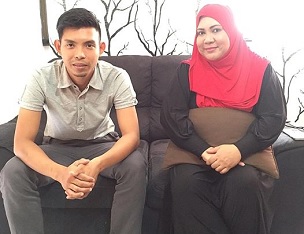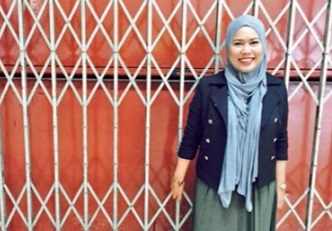
This interview was also published in Karyawan, A Magazine by the Association of Muslim Professionals (AMP), July 2016, Volume 11, Issue 2.
During our primary school days, my brother and I bought not only our Malay language and religious books but also soccer apparels such as boots and jerseys from Haji Hashim Enterprise.
Haji Hashim Enterprise used to be located at Geylang Serai and had branches at Onan Road and Arab Street. The store at Geylang Serai was later moved to Joo Chiat Complex while the Onan Road outlet was closed.
Set up in 1922, Haji Hashim Enterprise has witnessed rapid changes in Singapore, especially since independence in 1965. The book market, including Malay and Islamic books, has become more competitive over the decades. Competitors like Pustaka Nasional emerged in the 1960s, Toko Warisan in the 1980s and Wardah Books in the 2000s. A visit to the website of these rivals suggests that they now have a greater online presence than Haji Hashim, showcasing their latest collections and facilitating online purchases. Haji Hashim’s online foray is confined only to Facebook and Instagram.
Still, none of its competitors attained the kind of reputation that Haji Hashim enjoyed during its heydays – a household name with top-of-mind awareness among Malay/Muslim customers.
Haji Hashim’s other venture – sports apparel business – also took a hit when malls began mushrooming all over Singapore. Queensway Shopping Centre, which opened in 1976, for instance, became a draw for sports enthusiasts, with shops competing to offer substantial discounts on their sports goods and equipment.
Six years shy of the century mark, Haji Hashim has always been in the hands of family members. After the passing of Haji Hashim bin Haji Abdullah in 1968, his son Haji Yusof Bin Haji Hashim took over the helm, managing the shop at Onan Road and later Joo Chiat Complex. Following the death of Haji Yusof in 2009, his son, Haji Abdul Aziz Bin Haji Yusof succeeded him in managing the shop.
The Karyawan team recently spoke to Haji Abdul Aziz to learn more about Haji Hashim Enterprise and how it remains steadfast in the books business despite the rapid pace of development in Singapore.
The Beginning
Q: Haji Hashim Enterprise has been around for nearly a century now. Could you share with us the challenges that the company has been facing and how it has adapted to these changes, especially in the post-1965 era?
A: In those days, we had diverse sets of customers, a significant number of whom were workers from Malaysia. They were construction workers who returned to Malaysia usually about once a month. They regularly visited our shop to get items to bring home. We even sold bus tickets for them to return to Malaysia. Today, there are very few of them.
During the Malaysia Cup football fever at that time, football fans of the Malaysian states travelled to Singapore in quite a large numbers when their teams played arch-rivals Singapore. Likewise, Singapore too have their die-hard fans who made frequent soccer trips to Malaysia. We sold bus tickets to them as well.
Q: Were the Malaysian workers your largest customers then? What about the response from Malay/Muslim Singaporeans? We understand that Haji Hashim was also a household name among Malay/Muslim Singaporeans in those years.
A: No, they certainly do not form the largest proportion of our customers. But their presence did contribute significantly to our takings. We were well known among Malay/Muslim Singaporeans mainly because we were selling Malay school textbooks. In addition to that, we also supplied books to Malay schools then. So, each year before the start of the school year, there would be many parents and students coming to our shop. We would also be busy with orders from various schools. That’s how we made a name for ourselves in the community
Q: So did the revenues then come mainly from the sales and supply of textbooks?
A: No, I think there was fairly equal distribution between earnings from the Malaysian customers and the textbook business.
Our Younger Generation of Today
Q: Moving on, the younger generation today seems to be less aware of traditional Malay/Muslim bookstores. Haji Hashim may no longer be the household name in our Malay/Muslim community, even among the older generation. Do you share this observation and, if yes, why?
A: Yes. Indeed, the younger generation of today tends to be less inclined to reading books than that of the 60s to 80s, probably because of the various alternatives online. Those who patronise our shop do so to get religious books which are prescribed, for instance, by their religious schools or teachers.
Q: Are you still selling school textbooks. Wouldn’t this have reached out to the younger generation?
A: We no longer sell school textbooks. We do sell certain books like dictionaries and study materials like assessment papers, but our focus nowadays is more on religious books.
Q: What about sports apparel and equipment?
A: We do sell some sports products like sepak takraw balls, but it is not like in the past when we used to sell items and apparels of leading brands. The demand for these items is no longer there, and the suppliers we used to procure from have also closed. There used to be many along Serangoon Road but now not a single one of them is there. So we decided it is not worth continuing to provide such items.
Q: What is the biggest challenge that Haji Hashim has to face in recent years?
A: There is now a greater competition in this business with several more shops being set up over the decades, so there is pressure on the prices of our products. Even though there are not that many shops selling religious books and other products that cater specifically to the Malay/Muslim community, it’s nevertheless easy to lose customers, especially when your products are not priced competitively.
Q: Am I correct to say the competition in this business is keener now than it was in the past?
A: No. In the past when we sold school textbooks, we had competition too from booksellers at Bras Basah Road. In fact, it was fiercer then compared to what it is now. There were a lot of booksellers at Bras Basah and the foot traffic there was higher than it was here. Now, there are just a handful of competitors considering the nature of our business today but, still, we have to watch how we price our products, or we will lose customers to our competitors.
About the Malay/Muslim Entrepreneurs
Q: There have been opinions expressed by some people that the Malay/Muslim businesses are still lagging behind those of other communities. What is your opinion please?
A: I think education is important to breeding success in business. Malay/Muslims are better educated and more competitive today than they were in the past. Thus, I see no reason why they cannot be competitive in business.
Q: Do you think Malay/Muslim institutions have been effective in helping Malay/Muslim businesses to progress?
A: Malay/Muslim institutions have been running programmes like seminars and overseas business trips. I read them in the papers. But, being in the retail business, I do not see a fit between the programmes that are conducted and the nature of our business.
Q: What kind of programmes do you think would be useful to you?
A: Many of our products – apart from books which are imported from Malaysia – are supplied by non-Malay/Muslim suppliers. It would be helpful if they could help us to develop networks with suppliers outside of the community.
Q: Finally, what would be your advice to aspiring Malay/Muslim entrepreneurs? What are some of the values they should adopt so that they build a more sustainable business like Haji Hashim’s?
A: I think the prerequisite to any success is hard work. It is especially the case for those in retail. You have to work throughout the week, including Saturdays and Sundays, as these are the days when there is more traffic.
Mr Abdul Shariff Aboo Kassim is a Researcher / Projects Coordinator with the Centre for Research on Islamic and Malay Affairs (RIMA), the research arm of the Association of Muslim Professionals (AMP).
Photo Credit: Haji Abdul Aziz





